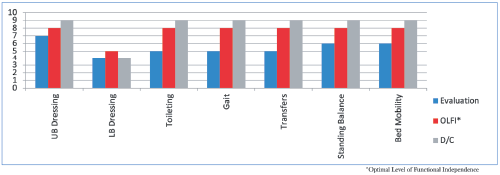Case Study
Admitting Diagnosis: Cerebral Infarction; Sepsis
Discharge Location: Home
An 84-year-old gentleman who was admitted to River Terrace Rehabilitation and Healthcare Center from Mount Auburn Hospital for continued skilled nursing and rehab needs following a hospital stay for Sepsis. Prior to his hospitalization, Mr. G. was modified independent at home with all ADLs, IADLs and mobility at his home where he lives alone in a condo on the 4th floor with 4 steps to enter into the home. Upon admission Mr. G. was evaluated by and participated in skilled occupational and physical therapy where he was noted to require maximum assistance for toileting, moderate assistance for lower body bathing and dressing and minimum assistance for upper body bathing and dressing. He also required minimum assistance for bed mobility, transfers, and ambulating 5 feet with a rolling walker. He worked hard with his nursing and therapy team and was able to make great improvements with all aspects of his health. Upon discharge, He was able to perform all self-care tasks, bed mobility, transfers, ambulating 100 feet with a rolling walker and ascending and descending 6 stairs without assistance. Mr. G. made great gains toward his therapy goals and was able to return home with VNA services. Awesome job Mr. G.!

10.0 – Complete Independent – No assist, no equipment
9.0 – Modified Independent – No Assist, but equipment or extra time
8.0 – S/u – No physical assist other than set-up; supervision for safety/technique; and/or single cue to initiate
7.0 – Supervision-No physical assist; supervision for safety/technique; and/or single cue to initiate
6.0 – SBA-Pt. performs task with close supervision and or visual/verbal cues for task completion
5.0 – CGA – Contact Guard Assist
4.0 – Min – Occasional assist (25% or less time or effort to complete)
3.0 – Mod – Frequent assist (40-50% of the time or effort involved to complete task
2.0 – Max – Constant assist (75-90% of the time or effort involved to complete task
1.0 – CD – Complete Dependence: No contribution from pt; task done by others or not assessed
Case Study
Admitting Diagnosis: Wedge Compression Fracture of Unspecified Lumbar Vertebra
Discharge Location: Home
A 75-year-old male was admitted to River Terrace Rehabilitation and Healthcare Center from St. Elizabeth’s Medical Center for continued skilled nursing and rehab needs following a fall at home resulting in an L1 compression fracture. His hospital stay was complicated by a stay in the ICU due to chronic obstructive pulmonary disease exacerbation. His status stabilized and he then required 3 liters of oxygen. Upon admission, Mr. S. was evaluated by and participated in skilled occupational and physical therapy where he was noted to require contact guard to moderate assistance for most self-care tasks, standby assistance to perform bed mobility and contact guard assistance to transfer and ambulate 15 feet with a rolling walker. He was also noted to have decreased strength and endurance impacting his independence. Mr. S. worked hard with his nursing and therapy team and was able to make progress with his functional abilities. Upon discharge, he was able to perform lower body dressing tasks with minimum assistance, toileting and upper body dressing tasks without assistance and was able to perform bed mobility, transfer and ambulate 100 feet with a rolling walker and modified independence on 3 liters of oxygen. He was also able to improve his strength and endurance to maintain safety and independence with his functional tasks. Mr. Salo made great gains toward his therapy goals and was able to return home with strong family support and home health services. Great job Mr. Salo.

10.0 – Complete Independent – No assist, no equipment
9.0 – Modified Independent – No Assist, but equipment or extra time
8.0 – S/u – No physical assist other than set-up; supervision for safety/technique; and/or single cue to initiate
7.0 – Supervision-No physical assist; supervision for safety/technique; and/or single cue to initiate
6.0 – SBA-Pt. performs task with close supervision and or visual/verbal cues for task completion
5.0 – CGA – Contact Guard Assist
4.0 – Min – Occasional assist (25% or less time or effort to complete)
3.0 – Mod – Frequent assist (40-50% of the time or effort involved to complete task
2.0 – Max – Constant assist (75-90% of the time or effort involved to complete task
1.0 – CD – Complete Dependence: No contribution from pt; task done by others or not assessed
Case Study
Breathing New Life: Pulmonary Rehabilitation Success at River Terrace
We are proud to share the inspiring recovery of a 57-year-old female patient admitted to our center from UMASS Memorial Health Alliance, Clinton Hospital-Leominster campus. She presented with a complex array of conditions, including acute on chronic respiratory failure with hypoxia and hypercapnia, toxic metabolic encephalopathy, COPD exacerbation, bacterial pneumonia, and hypoventilation syndrome with increased shortness of breath.
With such medically challenging circumstances, this patient required a specialized, multidisciplinary approach. Under the expert care of Pulmonologist Dr. Corey Saltin, Medical Director Dr. Faiyaz Hakim, Wound MD Emmanuel Jacob, Physiatry PA Margaret Loughman, and Specialty Program Lead-Respiratory Therapist Lori Carpenter, she has received comprehensive pulmonary care tailored to her unique needs. Our dedicated nursing team provides daily clinical support, ensuring every aspect of her recovery is carefully monitored and optimized.
At River Terrace, RespiraCare, our physician-led pulmonary rehabilitation program is designed to help patients achieve the most active life possible, despite complex diagnoses.
With features like on-site respiratory therapy, tracheostomy care, and 24/7 admissions direct from the ER, we are equipped to support even the most medically complex patients.
👉 Looking for pulmonary rehabilitation in Lancaster, MA?
Learn more about RespiraCare at River Terrace Rehab and how we can support your patients’ recovery:
https://riverterracerehab.com/cardiopulmonary-care/




